


The most commonly transplanted organs and tissues include kidneys, liver, heart, lungs, pancreas, bone marrow, corneas, bones, and small intestines.
Eligibility for Organ Donation
Organ donations for transplant surgeries come from living donors (typically related up to the fourth degree) or cadavers. For instance, healthy corneas and kidneys from individuals who have passed away due to heart diseases, are used to aid those with blindness or kidney disorders.
Impact of Organ Transplant Surgery
Organ transplant surgery significantly extends life expectancy, improves quality of life, and is cost-effective compared to other treatments for end-stage organ failures like dialysis. Organ transplantation and donation also enhance our nation's health and economic landscape, reducing dependence and recovering labor loss.

This procedure involves surgically placing a new kidney to replace non-functioning ones, enabling patients to continue their lives and activities.
Common Misconceptions About Renal Transplant
Religious Perspectives on Organ Transplantation
The Chaplain High Council of the Directorate of Religious Affairs, as of decree No. 396 dated March 6, 1980, has stated that organ transplantation is permissible and is considered a significant act of charity. This viewpoint is supported across various major religions and aligns with the teachings of the Quran, which equates saving a life to saving all of humanity.
